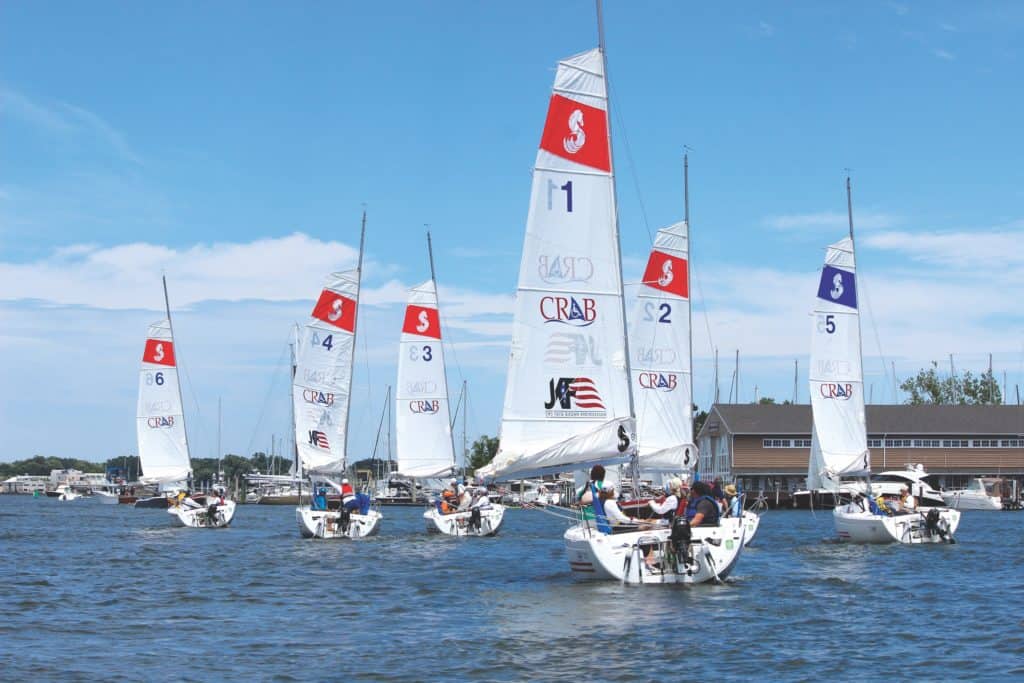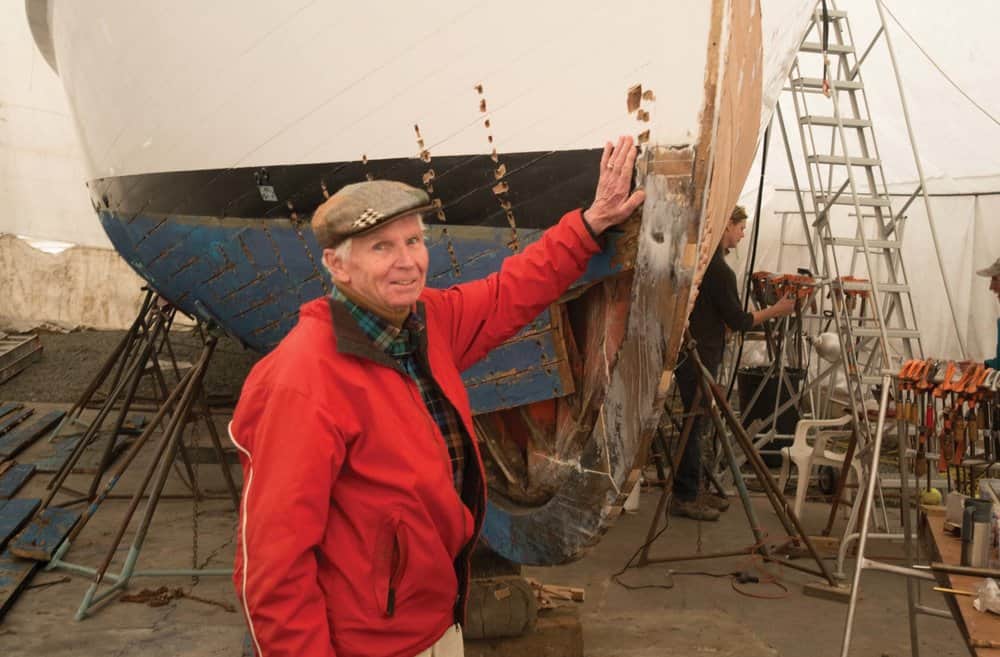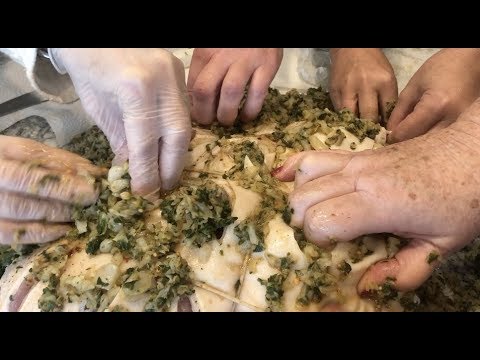Chesapeake Region Accessible Boating takes everyone sailing
It was not what one would consider prime sailing weather. The breeze off Sandy Point in the mid-Chesapeake Bay was fickle and light. The current, as always in this particular piece of water by the Bay Bridge, was determined. The sky was overcast, the seas lumpy as day-old gravy.
None of which mattered to Sebastian Ploszaj of Baltimore, who didn’t know sub-prime sailing weather from Shinola. What he did know is that he had just spent the morning with his wife and two young kids racing in the 14th Recovering Warrior Sailing Regatta hosted by Chesapeake Region Accessible Boating (CRAB), and he’d had so much fun at the helm that he was already signing up for a sailing class to learn more and thinking about how he would buy his own boat.
“I loved it. It actually gave me boat fever,” said Ploszaj, who was wounded twice during two tours in Iraq and has since retired from the Marine Corps. “I liked the racing, the atmosphere. The water makes me feel relaxed. What I like is, nowadays, everybody’s into technology. This brings you back to the basics, the essentials, sailing a boat with just the wind.”
His sentiments echoed those of Jay Streit of Severn, Md., a former Navy search-and-rescue expert and rescue swimmer who was injured in a helicopter crash during training in Nevada, and who started sailing with CRAB in 2017.
“The thing about sailing is, it doesn’t matter what your handicap is,” says Streit who, with his girlfriend, Dee Perry, a month-and-a-half later would win the 2019 Don Backe Memorial Regatta, one of CRAB’s premiere events, held out of Annapolis Yacht Club. “You’re all out there just fighting with the wind and the current—it’s all equal. You’re equal.”
Since its founding 28 years ago, this has been a core concept for CRAB, which in the past four years has experienced exponential growth and is now poised to achieve a major, previously unimaginable goal—an Adaptive Boating Center in the heart of Annapolis. During 2018’s six-month sailing season, CRAB’s volunteer skippers, crew, and landside helpers hosted 747 individual guests in over 45 events (a total of 2,535 volunteer hours), sailing in its fleet of six Beneteau First 22As—boats designed for mobility-impaired sailors. Some 439 sponsors and donors helped support a range of programs, including Family Sail Sundays, when people with disabilities and their families can sail together for free; group sails for organizations such as the Maryland School for the Blind, and Baywoods Assisted Living; sailing camps for kids from underserved neighborhoods, run in collaboration with local police departments; regattas, and sailing clinics.
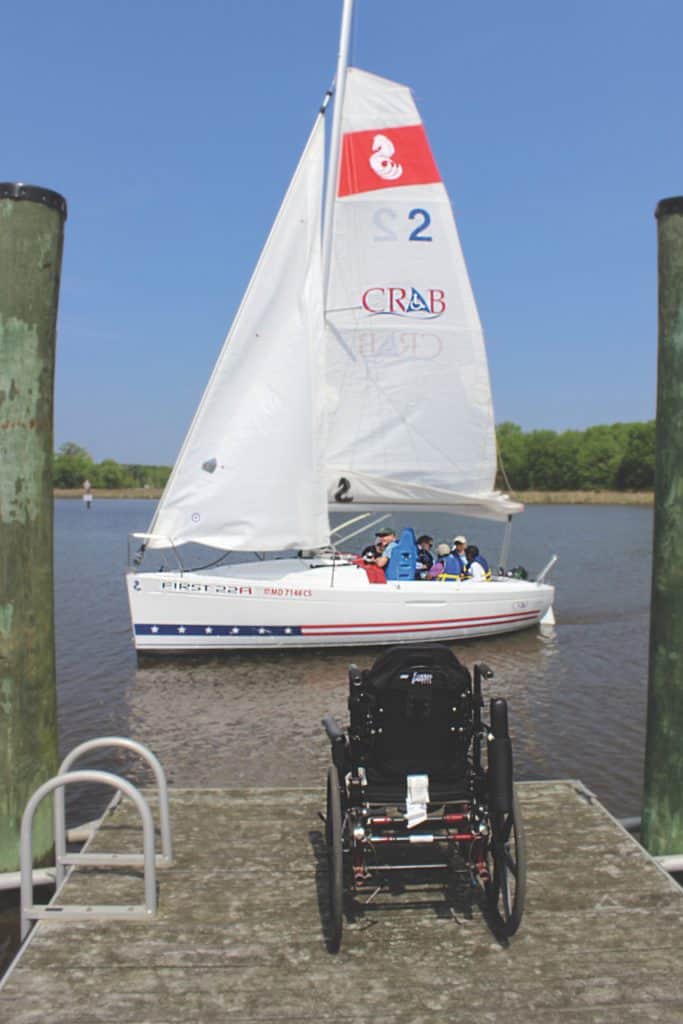
It is a gigantic amount of logistics, organization, and execution carried out from mid-April through October, all accomplished with two fulltime staff members, three part-time fleet directors, one summer intern, and a devoted corps of about 95 volunteers (as of 2018), many of whom have gone through a rigorous training process to become eligible to skipper or crew a CRAB boat and know how to safely hand the tiller off to someone who may have never sailed before.
It’s difficult to boil down to one thing what makes up CRAB’s special sauce, but the idea that before the wind and the elements, everyone plays on the same field, gets close. For the able-bodied, level playing fields can be found all day long in things as basic as easy access to a building, a car, or a boat. But for those living with physical or developmental disabilities, and for their family members and caregivers, finding a place that can help you onto that equal ground—or in this case, water—is powerful, life-affirming stuff.
The late Don Backe, who was paralyzed after a car wreck in 1987, knew this. A lifelong teacher and sailor, he founded CRAB in 1991, and with a fleet of four Catalina Freedom Independence 20s—boats designed by Gary Mull to accommodate people with disabilities—he got people sailing out of CRAB’s base at Sandy Point State Park near Annapolis. Well known in the sailing community, Backe’s blend of gentle humor and unwavering determination earned him and his cause steady support and wide admiration, although despite his indefatigable efforts, CRAB often hung by a shoestring.
“Don was a fantastic big-picture guy and a dreamer,” says Lance Hinrichs, a lifelong sailor, former president of CRAB’s board, and a quadriplegic who has been in a wheelchair since 1982. “If you think about the idea of, ‘I’m going to start a handicapped sailing program, and it’s going to be a self-sustaining entity,’ that’s not really a realistic or rational thought, but despite it all, he did it. Damn the torpedoes, full speed ahead. That didn’t make him a great administrator, though, and we were constantly struggling to pay the bills and keep the place going.”
When Backe’s health began to fail and he could no longer run the programs, the board sought an executive director who could take over CRAB’s operations. Eventually the board, now under the leadership of Brad LaTour, asked member Paul “Bo” Bollinger to step into the executive director’s role in 2016. A lifelong boater, Bollinger’s career included 16 years working for aviation professional and trade associations such as the American Association of Airport Executives, the Airport’s Council International, and the Air Traffic Control Association.
“One of our biggest accomplishments that I believe has fueled much of our growth is transitioning from a board-run organization to a staff-run organization,” says LaTour, an outgoing and dynamic entrepreneur who learned about CRAB in 2003 after a good friend was paralyzed in an accident. “It wasn’t always easy, but when you’re lucky enough to attract the leadership talent like we have in Paul Bollinger, you must seize the opportunity.”
As a force for CRAB, Bollinger is as determined as Backe was. Almost evangelical in his support for CRAB’s mission, he and the board have worked steadily to raise the bar, offer more programs, bring in more guests, and attract more donors and supporters. In 2017, CRAB replaced its fleet of four 30-year-old Freedom 20s with six new Beneteau First 22As (A for adaptive), accomplishing this feat with the help of Annapolis Yacht Sails and Beneteau, which donated the first two boats and sold the remaining four at cost. The Kagan Family Foundation funded the purchase of two boats, the Morris family funded a third in memoriam of their husband and father, and funds raised at the 2017 CRAB Cup paid for the sixth boat.
Behind the scenes but no less important, the organization professionalized the training process for skippers, requiring a background check, developing a Volunteer Operations and Training Manual, and adding an apprenticeship period before skippers can take guests out sailing. The group published its first professional annual report in 2017 and worked to steadily climb the ranks in the international nonprofit ratings organization GuideStar, earning the top platinum status within three years, by 2018.
“Our growth over the past few years has been nothing short of energizing,” says LaTour. “I often share with my team that CRAB is a 28-year overnight success story. When I was elected president in 2017, my goal was to double the revenue within the next two years, not knowing how at that point, but convinced by CRAB’s legacy and the pureness of our work. That provided the confidence, and I knew we could grind through the rest, which resulted in achieving that goal in just the first year—including our first-ever successful bond bill campaign. That success really opened our eyes to what often leads to great results—thinking, ‘Why not CRAB?’ ’’
But growing pains always accompany growth, and CRAB has been no exception. Dock space at Sandy Point is limited, restricting the number and types of boats CRAB can have. More problematic is that as one of the state’s most popular parks, it’s not uncommon for Sandy Point to fill up and close early on summer days, barring access to CRAB clients. The Adaptive Boating Center, once an unthinkable dream, began to become a pressing reality.
“Bo was the one who latched on to it and said, ‘This is what we gotta do,’’’ Hinrichs says. “I think he came to the conclusion that when push came to shove, we can’t get people into the park on weekends. If we can’t do that, then what can we do, what’s the point?”
So began an arduous, strategic process to puzzle together how this might work. After locating an existing marina on Back Creek that would serve CRAB’s purposes and was for sale, the organization worked to achieve the funding. After failing to get a requested $500,000 in state support during the 2018 legislative session, CRAB approached 2019 with high hopes, tireless behind-the-scenes efforts, and a sense of momentum.
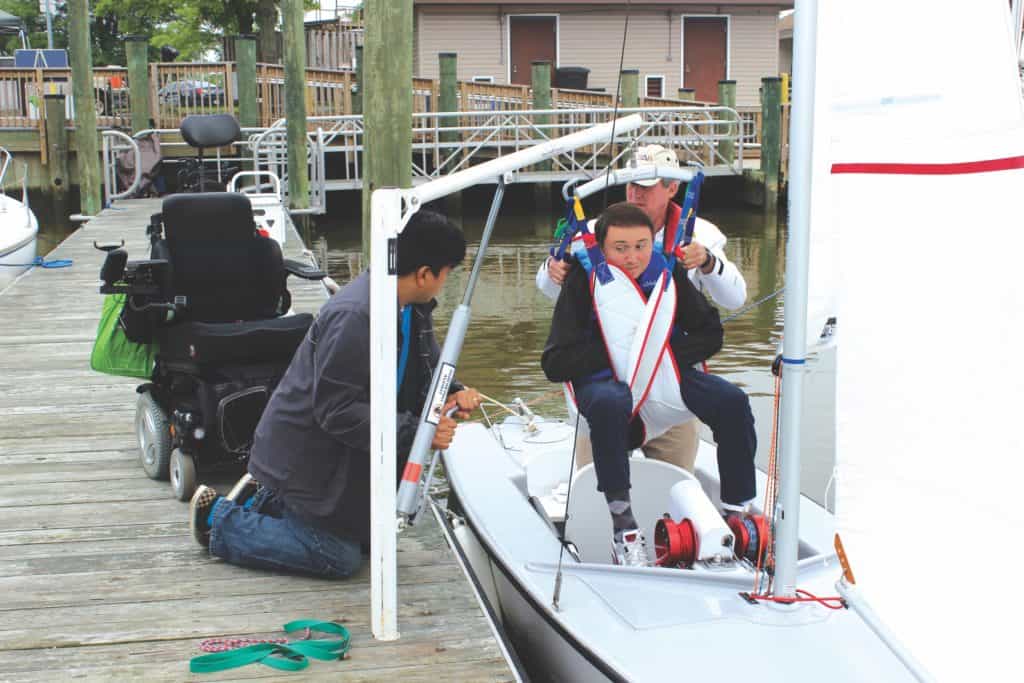
It all paid off. Gov. Larry Hogan committed $1 million in the state Capital Improvement Program budget for the Adaptive Boating Center, and it was approved by the state legislature. County Executive Steuart Pittman and Anne Arundel County committed $1.3 million from Program Open Space. After some debate, Annapolis City Council unanimously committed $500,000 of the city’s open space funds and agreed to own the property. A long-term lease put CRAB in charge of the boating center, and CRAB has used this momentum to kick off a $700,000 capital campaign to help fund additional improvements to the grounds, building, and docks.
The Adaptive Boating Center, which Bollinger hopes will be up and running by next year, will allow CRAB to expand its programs, as well as add a pontoon boat to take people fishing or enable guests who can’t or don’t want to leave their wheelchairs to get out on the water. Adaptive water-skiing is another possibility, as is accommodating CRAB supporters who want to host people on their own boats for a day on the Bay. It will also give CRAB a place to showcase and prep donated boats that are for sale, as well as host its own regattas and events.
“I have been told the Adaptive Boating Center was always a dream of Don Backe, who passed away in 2013,” Bollinger says. “We hope to make it a reality not only for Don, but for the thousands of people with disabilities who will benefit from this premier facility and the new boating programs we will be able to offer.”
For volunteer skipper Ange Brock, the boating center will be a jewel in the crown of the sailing community in Annapolis and the larger Chesapeake region. An investment banker whose brother has special needs, Brock knew about CRAB for some time and began volunteering in 2017. By 2018, she was the group’s top skipper in terms of volunteer hours on the water. She likes the organization’s disciplined, professional approach. And she, like so many people associated with CRAB, believes deeply in its mission.
“It’s important to me to raise awareness that everyone has an ability, and I want to highlight people’s abilities over their disabilities,” Brock says. “This gives opportunities to a community that’s often ignored to enjoy the wonder and freedom of sailing. And I get to come down here, turn off the phone, and come to the water where everyone is friendly . . . You can’t have a sailing ego out here, because everybody is a volunteer and is out here for a heartfelt reason as opposed to a professional reason.”
Maude Laurence, who was CRAB’s top volunteer crew in 2018, learned about the group through her husband David, a sailor who was wheelchair-bound after a suffering an aneurysm.
“When you’re in a wheelchair your world gets very limited,” Laurence says. “When I first heard about this, I thought, ‘How are they going to do this? I can barely get him into the bathroom!’
He was 6 foot 4, and they got him on a transfer platform and slid him right over to the boat, it was amazing. It lit everybody up. It was truly amazing.”
Two weeks after that first exhilarating sail, David died, and Laurence turned to CRAB.
“I went from being a fulltime caregiver to being not a fulltime caregiver. It felt like a good thing for me to be able to do something, and frankly it’s been helpful in my healing,” she says. “It puts me on the water and lets me help people, I just consider that a joy. I’ve made a lot of friends at CRAB, and I get joy out of seeing a lot of the same faces over and over. You get to know them. It’s like coming home.”
Bollinger says that CRAB now has more skippers and crew that it ever has before.
“The youngest volunteer skipper is a former Yale women’s sailing team member, and we have skippers in their 60s who have retired or sold their boats and still want to sail with people who greatly appreciate their devotion to teaching people with disabilities how to sail,” he says. “We even have a skipjack captain from the Eastern Shore, and many more with a variety of backgrounds.”
Hinrichs believes that the empowering nature of what happens
at CRAB—for the guests and volunteers alike—has helped it survive, grow, and thrive. It’s something that Don Backe knew in his heart from the beginning.
“I think Don Backe would be amazed at the progress of the organization,” Hinrichs says. “He worked very hard to build something that was important and lasting. And to see it growing well beyond anything that was previously accomplished would make him proud and ecstatic, because at the end of the day, Don was all about trying to serve others. And this has truly impacted people’s lives in significantly important ways.”

